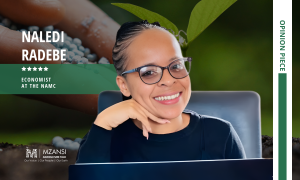Over 100 women gathered at Matambandou in North West province for an agriculture seminar themed ‘Farming In Heels’ on Saturday, to mark Women’s Month.
Founded and hosted by Kamo Bombe, the seminar imparted knowledge on how to farm successfully with various commodities.
Expert speakers, who are women farmers in their capacity, took to the podium to share the much needed knowledge on how to operate farming and agro-processing businesses.
Hlobizile Yende who farms livestock and crops, informed aspirant farmers that the best way is to always start with what you have.
She advised women that it’s important to also be able to sell their businesses or ideas.
“Research the commodity that interests you and also take compliance seriously as it can be a deal breaker at some institutions or retailers,” she said.
Yende advised the ladies that although diversifying their farming business can be good at times, they need to make sure not to over diversify.
“Rather stick to diversifying within your chain,” she said.
Speaking about cattle farming, farmer Ipeleng Kwadi said that getting into this type of commodity is as tough considering the age of climate change that we now live in.
“Firstly, you need to decide the type of cattle you need to farm with – then check its pros and cons.
“Also when buying cattle, you need someone who is knowledgeable about them to avoid making mistakes.
“It is therefore advisable to collaborate with other farmers in your areas so that you may share ideas…again be organised by being part of farmer association and agricultural structures that exist in your area as it is where you will get full knowledge and grow as a farmer,” she said.
Pig farmer and agro-processor Nomathemba Phaahla (nee Langa), said that she started getting involved in farming back in 2015.
She shared that even though she got involved due to her parents’ involvement in farming, her perspective changed after she attended a course in farming.
Langa is not only farming pigs but she is also involved in the processing side of the business as well.
Langa said she never liked the idea of selling her pigs at auctions, so Covid-19 came as a blessing in disguise as she started slaughtering and delivering meat.

“During Covid-19, I started packaging meat at our in-house butchery and selling it to other butcheries as well.”
She, however, said that slaughtering and selling is not as easy and you have to comply with butchery regulations and also, how the meat is transported.
She said that being compliant will open lots of doors and advised the ladies to strive for compliance in whatever they embark on.
She is now working on bringing in game meat as well.
Langa said that there are lots of opportunities in the agriculture value chain, meaning one doesn’t necessarily have to be a farmer to get involved in the sector.
Mmabatho Morudi, a qualified beekeeper from Local Village Africa, shared knowledge on how she started.
Morudi and her partner in business combined their passion for social upliftment and conservation to deliver high quality produce to people into one social enterprise. They went into African countries where they trained people on beekeeping and also helped them establish their enterprises.
“We then bought back their produce to sell to the public,” she said.
Their offerings include artisanal Granola, African indigenous Wholefoods, Raw honey and Botanical ice tea.
Morudi also emphasized on the issue of being compliant, especially if you intent selling to big retailers.
She said packaging is also of utmost importance as it helps distinguish your products from the rest.
She advised the audience that the first few years in farming are tough, as it is highly unlikely that they’d make profit.

Her parting words was for those in agriculture to also consider the environment.
The seminar was sponsored by Nestle and Standard Bank.
In an interview with Mzansi Agriculture Talk, founder Kamo Bombe said that the idea of hosting these seminars was prompted by the fact that when she started in the industry, access to information was rare.
“When I started posting what I was doing on social media, a lot of people started asking for mentorship and that’s when the idea was born.”
She says the seminar has grown so much that they are now also doing AgriSeta accredited trainings.
“We are also attracting women from the neighbouring countries such as Lesotho and Botswana and this shows us that there’s still lack of access to information for many women who want to get into farming.
“These trainings help farmers when they apply for funds and assistance from institutions.”
The seminar concluded with a poultry masterclass where women were taught how to grow layers and broilers, especially on factors such as chicken house ventilation and administering medication.
The second leg of the event will be hosted in Mpumalanga on September 14.




















